Daily Vocabulary Words: List of Daily Used Words in Leading International Newspapers
Hi there. Welcome to this special section @ Wordpandit.
Our endeavour here is very simple: to highlight important daily vocabulary words, which you would come across in leading newspapers in the country. We have included the following newspapers in our selection:
• The New York Times
• The Washington Post
• Scientific American
• BBC
• The Guardian
• Psychology Today
• Wall Street Journal
• The Economist
We are putting in extensive work for developing your vocabulary. All you have got to do is be regular with this section and check out this post on a daily basis. This is your repository of words that are commonly used and essentially, we are posting a list of daily used words. Hence, this has significant practical application as it teaches you words that are used commonly in leading publications mentioned above.
Visit the website daily to learn words from leading international newspapers.
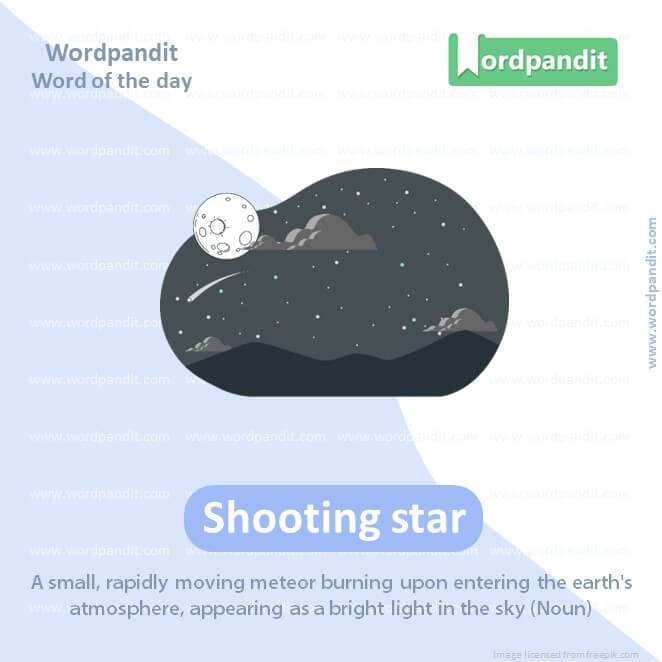
WORD-1: Shooting star
CONTEXT: Volodymyr Zelenskyy is a forgotten man fighting a forgotten war. The Ukrainian president’s shooting star has lost much of its altitude and gleam as Russia’s grinding invasion approaches the two-year mark.
EXPLANATORY PARAGRAPH: A shooting star is not really a star shooting across the sky. It’s a small piece of rock from space that burns up and looks like a fast-moving light in the sky at night. It’s like a quick, bright streak in the dark.
MEANING: A small, rapidly moving meteor burning upon entering the earth’s atmosphere, appearing as a bright light in the sky (Noun).
PRONUNCIATION: SHOO-ting star
SYNONYMS: Meteor, falling star, comet, fireball, meteorite
USAGE EXAMPLES:
1. We saw a shooting star while camping last night.
2. Make a wish on a shooting star.
3. The sky was clear, perfect for spotting shooting stars.
4. The child was excited to see her first shooting star.
WORD-2: Gleam
CONTEXT: Volodymyr Zelenskyy is a forgotten man fighting a forgotten war. The Ukrainian president’s shooting star has lost much of its altitude and gleam as Russia’s grinding invasion approaches the two-year mark.
EXPLANATORY PARAGRAPH: Gleam is like a soft, shiny light that comes from something, not too bright but pretty, like the way a new coin or a wet leaf shines in the sun.
MEANING: A shine or glow that is not too bright, often seen on a smooth surface (Noun); To shine softly and brightly (Verb).
PRONUNCIATION: gleem
SYNONYMS: Glow, sparkle, shine, glimmer, twinkle
USAGE EXAMPLES:
1. The moon’s gleam on the water was beautiful.
2. His polished shoes gleam in the sunlight.
3. She saw a gleam in his eyes.
4. The gleam of the lighthouse guided ships.
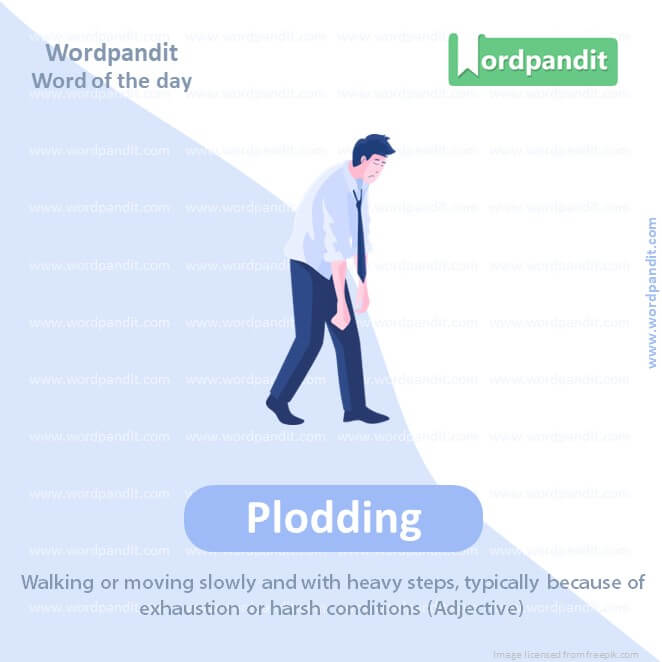
WORD-3: Plodding
CONTEXT: An old war has turned into a plodding stalemate. The ballyhooed Ukrainian “offensive” has stalled. The promised “breakthrough” remains stubbornly elusive – if possible at all. The lethal, tit-for-tat exchanges have sadly become routine. Stoicism has replaced outrage. However it may be defined, “victory” is far beyond strategic or even conceivable reach.
EXPLANATORY PARAGRAPH: Plodding is like walking slowly and heavily because you’re tired or bored, kind of like how you walk when you don’t want to go to bed.
MEANING: Walking or moving slowly and with heavy steps, typically because of exhaustion or harsh conditions (Adjective).
PRONUNCIATION: PLOD-ing
SYNONYMS: Trudging, lumbering, slogging, tramping, shuffling
USAGE EXAMPLES:
1. After the long hike, he was plodding along the path.
2. The day seemed to be plodding by very slowly.
3. They were plodding through the deep snow.
4. Her plodding steps showed her exhaustion.
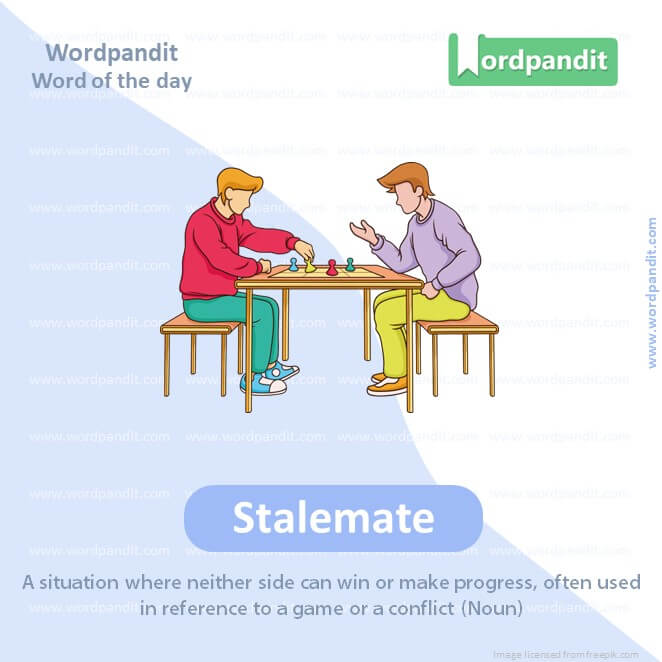
WORD-4: Stalemate
CONTEXT: An old war has turned into a plodding stalemate. The ballyhooed Ukrainian “offensive” has stalled. The promised “breakthrough” remains stubbornly elusive – if possible at all. The lethal, tit-for-tat exchanges have sadly become routine. Stoicism has replaced outrage. However it may be defined, “victory” is far beyond strategic or even conceivable reach.
EXPLANATORY PARAGRAPH: Stalemate is like when you and a friend can’t win a game because you’re both stuck and can’t make a move that helps you win, like a tie in a game of checkers.
MEANING: A situation where neither side can win or make progress, often used in reference to a game or a conflict (Noun).
PRONUNCIATION: STAYL-mayt
SYNONYMS: Deadlock, impasse, standoff, draw, gridlock
USAGE EXAMPLES:
1. The chess game ended in a stalemate.
2. The negotiations reached a stalemate.
3. They were at a stalemate in their discussion.
4. To break the stalemate, they needed a new approach.
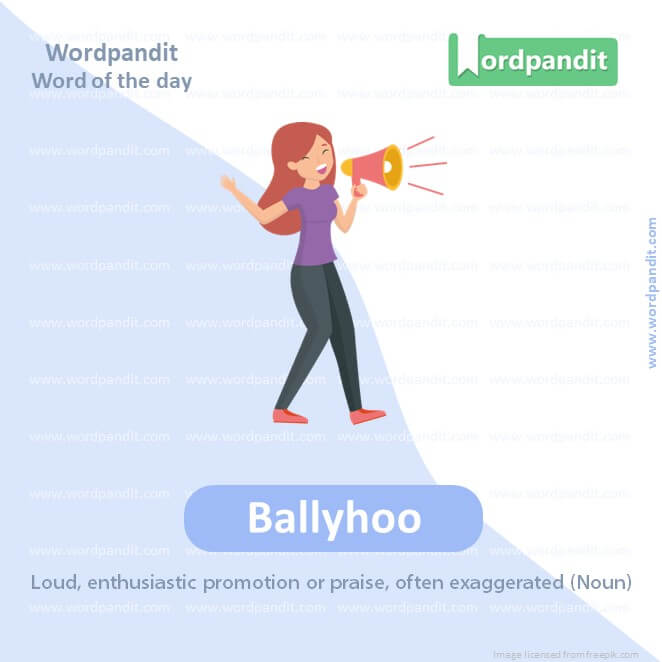
WORD-5: Ballyhoo
CONTEXT: An old war has turned into a plodding stalemate. The ballyhooed Ukrainian “offensive” has stalled. The promised “breakthrough” remains stubbornly elusive – if possible at all. The lethal, tit-for-tat exchanges have sadly become routine. Stoicism has replaced outrage. However it may be defined, “victory” is far beyond strategic or even conceivable reach.
EXPLANATORY PARAGRAPH: Ballyhoo is like a lot of noise and excitement about something, often to get attention, like when people shout and cheer at a fun parade.
MEANING: Loud, enthusiastic promotion or praise, often exaggerated (Noun); To praise or publicize with a lot of noise or excitement (Verb).
PRONUNCIATION: BAL-ee-hoo
SYNONYMS: Hype, fuss, commotion, publicity, fanfare
USAGE EXAMPLES:
1. The movie was surrounded by a lot of ballyhoo.
2. They ballyhooed the new product launch.
3. Amidst the ballyhoo, the celebrity arrived.
4. The festival was a ballyhoo of colors and music.
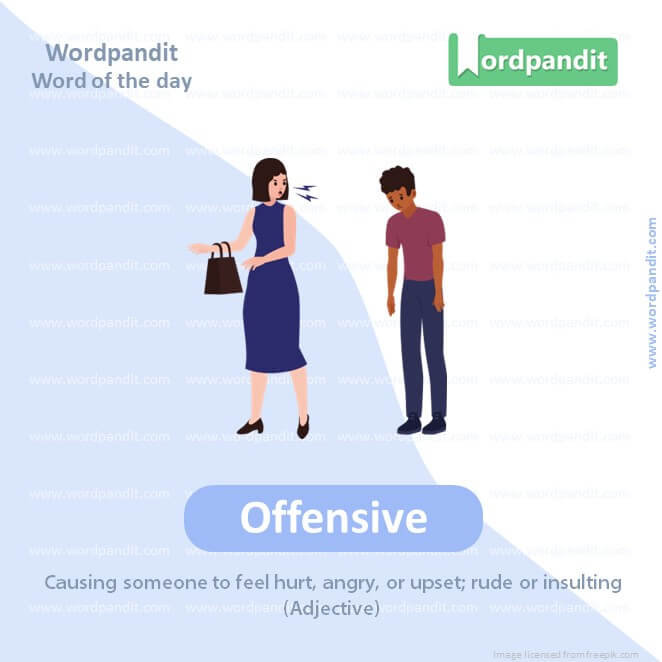
WORD-6: Offensive
CONTEXT: An old war has turned into a plodding stalemate. The ballyhooed Ukrainian “offensive” has stalled. The promised “breakthrough” remains stubbornly elusive – if possible at all.
EXPLANATORY PARAGRAPH: Offensive is when something is rude or hurts someone’s feelings, like saying something mean or making fun of someone.
MEANING: Causing someone to feel hurt, angry, or upset; rude or insulting (Adjective).
PRONUNCIATION: uh-FEN-siv
SYNONYMS: Insulting, disrespectful, hurtful, rude, obnoxious
USAGE EXAMPLES:
1. His comments were considered offensive.
2. They launched an offensive attack in the game.
3. The joke was in bad taste and offensive.
4. She apologized for her offensive language.
WORD-7: Stalled
CONTEXT: An old war has turned into a plodding stalemate. The ballyhooed Ukrainian “offensive” has stalled. The promised “breakthrough” remains stubbornly elusive – if possible at all.
EXPLANATORY PARAGRAPH: Stalled is like when something stops moving or working, like when your toy car won’t go because the batteries are out.
MEANING: Stopped or made to stop, especially temporarily and unable to continue (Adjective).
PRONUNCIATION: stawld
SYNONYMS: Halted, stopped, paused, delayed, immobilized
USAGE EXAMPLES:
1. The car stalled in the middle of the road.
2. The project stalled due to lack of funding.
3. Negotiations have stalled again.
4. The computer system stalled unexpectedly.
WORD-8: Elusive
CONTEXT: An old war has turned into a plodding stalemate. The ballyhooed Ukrainian “offensive” has stalled. The promised “breakthrough” remains stubbornly elusive – if possible at all.
EXPLANATORY PARAGRAPH: Elusive is like something that is hard to catch or understand, like trying to catch a butterfly with your hands. It’s tricky and keeps escaping.
MEANING: Hard to find, catch, or achieve; difficult to remember or understand (Adjective).
PRONUNCIATION: ee-LOO-siv
SYNONYMS: Evasive, slippery, tricky, hard to catch, fleeting
USAGE EXAMPLES:
1. The elusive criminal was finally caught.
2. The solution to the puzzle was elusive.
3. He gave an elusive answer to the question.
4. The rare bird is known for being elusive.
WORD-9: Tit-for-tat
CONTEXT: An old war has turned into a plodding stalemate. The ballyhooed Ukrainian “offensive” has stalled. The promised “breakthrough” remains stubbornly elusive – if possible at all.
EXPLANATORY PARAGRAPH: Tit-for-tat is like when someone does something to you, and you do the same thing back to them, like if your brother takes your toy, and then you take one of his toys.
MEANING: The action of repaying an injury or insult with a similar kind of behavior (Noun); Repaying in kind (Adjective).
PRONUNCIATION: TIT-for-tat
SYNONYMS: Retaliation, payback, reprisal, eye for an eye, reciprocity
USAGE EXAMPLES:
1. Their argument turned into a tit-for-tat exchange.
2. He believed in a tit-for-tat response to insults.
3. The siblings engaged in a tit-for-tat battle over toys.
4. The trade war escalated into a tit-for-tat tariff imposition.
WORD-10: Stoicism
CONTEXT: An old war has turned into a plodding stalemate. The ballyhooed Ukrainian “offensive” has stalled. The promised “breakthrough” remains stubbornly elusive – if possible at all.
EXPLANATORY PARAGRAPH: Stoicism is like staying calm and not showing your feelings, even when things are hard or you’re upset, like keeping a straight face when you scrape your knee but it really hurts.
MEANING: The endurance of pain or hardship without showing feelings or complaining (Noun).
PRONUNCIATION: STOH-ih-siz-um
SYNONYMS: Endurance, patience, resilience, self-control, fortitude
USAGE EXAMPLES:
1. He faced his challenges with stoicism.
2. Stoicism helped her during tough times.
3. The philosophy of stoicism emphasizes self-discipline.
4. His stoicism was evident in the face of adversity.
Vocabulary List English
In the vibrant marketplace of language learning, a ‘vocabulary list English’ is akin to a beautifully stocked grocery list – a tool that equips learners with basic ingredients necessary for fluent communication. However, absorbing the ‘vocabulary list English’ proficiently requires more than mere memorization; it calls for an informed and strategic method of learning.
The initial step towards mastering ‘vocabulary list English’ involves adopting an interactive approach. Instead of just reading and revising, use flashcards or digital memory tools to make the process more engaging. Such modes of learning not only retain interest but also boost retention and comprehension.
When learning ‘vocabulary list English’, practice is a fundamental element. Use these words in routine conversations, emails, or social media posts. The more frequently you use the words, the swiftly their usage becomes second nature.
A crucial part of understanding ‘vocabulary list English’ lies in knowing the context. Simply knowing a word’s meaning isn’t enough; you must know how it’s used in different situations. Reading a variety of materials, from fiction and newspapers to blogs and digital content, offers insight into the practical application of these words, deepening your understanding.
Furthermore, it’s vital to frequently revise ‘vocabulary list English’. Call back to what you’ve learned and give it another run-through. This habit strengthens memory retention and enhances the likelihood of the words being accessible when needed.
In conclusion, mastering ‘vocabulary list English’ is achieved through a blend of engaging tools, active practice, contextual understanding, and regular revision. These strategies, combined, can make the task of mastering ‘vocabulary list English’ a less overwhelming and more rewarding journey. As you venture into this process, you grow and expand your English vocabulary, achieving a heightened level of fluency and confidence in your English communication abilities.













